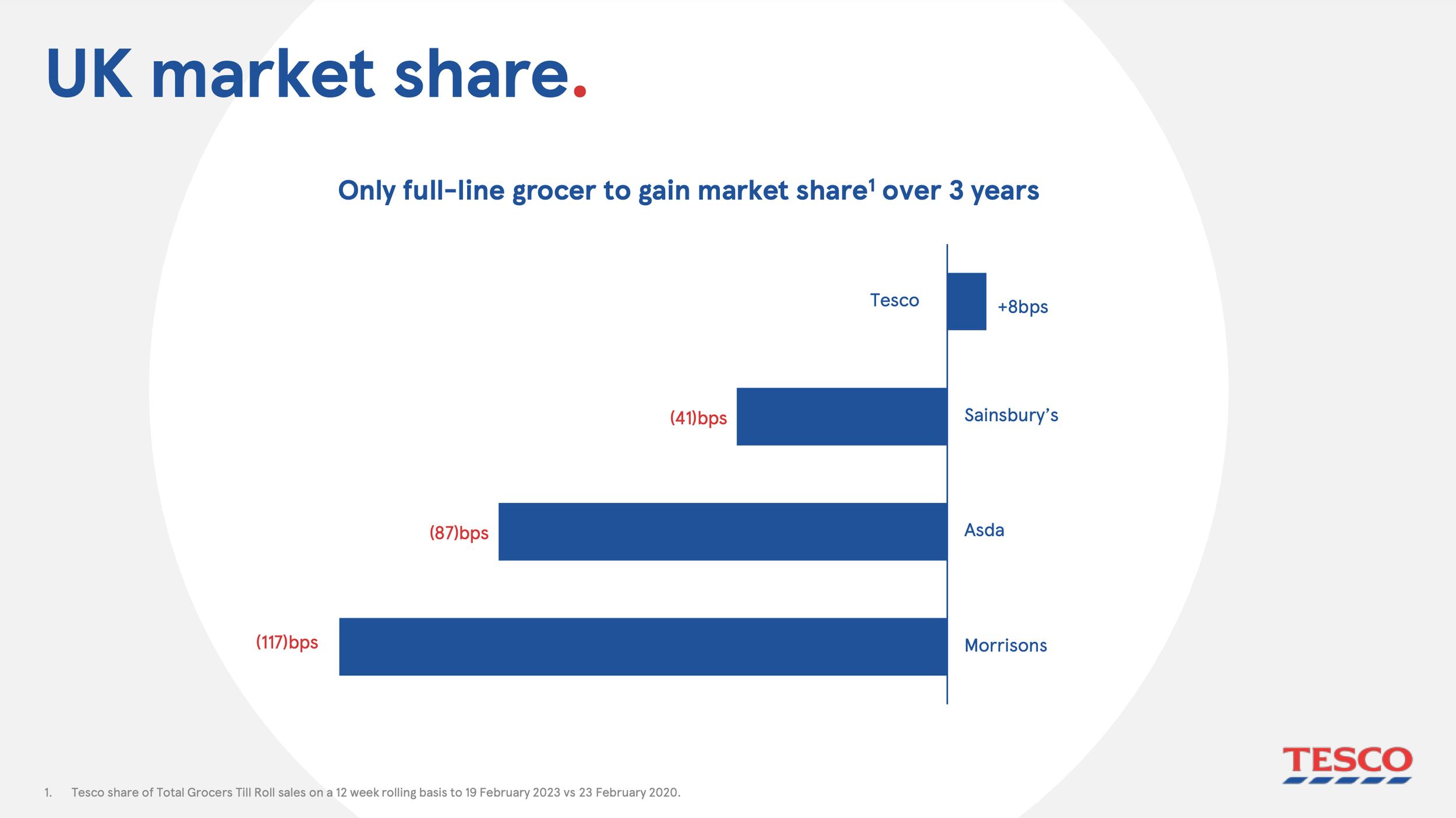Five key takeaways from Tesco’s Preliminary results for 2022/2023
The British grocery giant Tesco gave a trading update about its performance during its fiscal year 2022/2023. Here are five key takeaways from that announcement.
#1: Only former Big 4 grocer to take market share
The German discounters Aldi and Lidl have been wreaking havoc in the UK grocery market since the rapid rise of inflation about a year ago. This has led the grocers to benchmark performance to other "full-line grocers". This is a convenient way to change the playing field so that own performance looks better as the rapidly growing discounters don't "distort" the results.
Tesco has gained robust growth of 4,7% over the last year. However, one should remember that inflation has been running wild during this period, with Year on Year growth numbers hovering well above 10%. Food products drove the growth, as non-food sales declined for the entire year.
Tesco's growth came at the expense of profits, which declined by -6,9%. The profits were hit as Tesco invested heavily to lower its prices, lock the prices of over 1 000 products and match over 600 products to Aldi's prices.
These investments enabled Tesco to be the only "full-line grocer" to grow market share over the last three years. The biggest losers of market share have been Morrisons' and Asda.
#2: The price gap to Aldi and Lidl remains big
Price matching is a natural decision to counteract the rapid rise of Aldi and Lidl. Tesco emphasised how much they had been to cut the price difference from the discounters.
The image also shows how the average of the other full-line grocers has gradually increased due to inflation. With its "fundamental repositioning of price", Tesco wants to remain significantly below the average of full-line grocers.
However, the image also shows that Tesco (and other full-line grocers) are significantly more expensive than discounters.
#3: ”Better Baskets”: increasing the amount of healthy and affordable products
The obesity crisis has been a big discussion topic in the UK for quite a while. The HFSS (High in Fat, Sugar and Salt) legislation has gradually been introduced, impacting how certain products can be advertised and promoted inside the store. With these changes in mind, Tesco launched "Better Baskets" one year ago, a range of healthy and affordable products.
Currently, "Better Baskets" products account for 60% of sales volume. Tesco has stated a target of 65% of volume by 2025. Since the campaign's launch, Tesco has been able to remove 71 billion calories from the products it has sold. The aim is to remove 100 billion calories by 2025.
#4: Online returning to growth
Like most online grocery retailing in Europe, 2022 saw declining revenues and volumes. However, that decline plateaued and, for many, turned to growth during the latter part of 2022.
For Tesco, online declined during the first half of fiscal 2022/2023 and returned to growth of 1% during the second half. Currently, online stands at 12,8% of UK revenues, 3,6 %-points higher than before the pandemic.
With revenues of £5,6 billion, Tesco claims to have a 35% market share of the UK online grocery market. That is a lot more than the about 27% market share overall.
“We have a meaningfully bigger online business than we had 3 years, 60% larger than it was pre-pandemic, a £5,5 billion business. So not far off as big as our convenience store business.”
Tesco also noted that they had opened six Urban Fulfilment Centers (UFC or MFC for other retailers). The company plans to open "another couple this year".
The other part of Tesco's online business is the rapidly expanding partnership with the quick delivery company Whoosh. Since the launch in May 2021, Tesco has expanded Whoosh to 1 000 locations. Currently, the Whoosh service covers 55% of the UK population, and the average delivery time is about 25 minutes.
#5: Booker outgrows other segments with +12% growth
The big trend in food consumption has been the growth of out-of-home eating. It has taken the majority of food spend in the US and is doing the same in many European markets. Similarly to Kesko in Finland, Tesco is capitalising on that trend with wholesaling.
Since Tesco acquired Booker in 2017, it has thrived. In FY 2022/2023, the Catering segment grew exceptionally well, with 26,7% growth. Tesco CFO Imran Nawaz stated that the pressures on profit from the retail business (price competition, increased costs) were somewhat offset by Booker's excellent performance (and profitability?).





